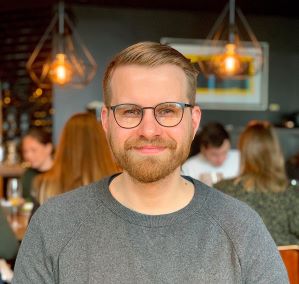How did you get your current job?
Repeating the same cliché I’ve been hearing over and over while I’ve been studying: A lot of luck. There are four ways to get into the foreign ministry of Norway: “Aspirantkurset” (two-year paid course to become a diplomat), “admirantkurset” (one-year paid course to become an administrative advisor), apply for a stray opening at Jobbnorge for certain positions they can’t fill internally, and finally, to already have a security clearance and contact Manpower for a part time job. I did the latter and got a part time job at the Foreign Service Response Centre. Working there as I finished my master’s thesis, I was then offered a one-year contract, which in turn gave me the option to apply for a fulltime position during internal job announcements.
What do you think were the most important factors for you getting the job?
To be honest, I believe getting the part-time job was mostly about me having a security clearance and being flexible on working nightshifts. Everything after that was about being a good colleague, asking questions and learning as much as possible. I do however firmly believe that finishing my master’s thesis was a driving factor for getting a fulltime position. I could then argue during the interview that I could help develop the response centre’s emergency plans and contribute in writing reports for distribution within the ministry.
What are your main responsibilities?
Primarily being there: day, evening and night, weekdays, weekends and holidays. We help Norwegians abroad that are experiencing small and big consular emergencies. From people losing their passports, to losing a loved one abroad, getting arrested or being in an ongoing terrorist attack. We answer phone calls routed from various closed Norwegian embassies around the world and give preliminary consular support. For bigger emergencies, we have a duty to alert the rest of the organization and possibly other ministries and relevant organizations. We also work in the section’s e-mail post box for both requests for help and use it for internal case processing. If you have ever read the news about some Norwegian person abroad in distress, there is a chance that I have written the ministry’s official (and probably vague) comment on the case. Finally, we also monitor international media 24/7 to pick up on any potential emerging crisis that will affect Norwegians abroad. From this monitoring, we also write weekly briefs to the crisis staff where we predict potential crises for the week to come.
What are you working on right now?
I usually do not work on larger projects as the job is more about managing various emerging cases as described above. I love the fact that when I hand over the reins to the next shift, I know they will handle whatever current cases we are working on. Lately however, I have been contributing into a weekly situational report regarding Covid-19, which is broadly distributed to the organization. I was also newly elected as the health and safety representative for my section and the section below us, meaning I will meet with the leadership now and then to ensure a safe and healthy work environment.
How do you use your education form PECOS in your current job?
As you have probably already guessed, my main tasks at work is not directly relevant to my education. However, for the various writing assignments I do on the side, I use the skills I learned at PECOS frequently. I especially want to highlight acquiring new information and knowledge in a rational, systematic and critical manner, as well as integrating this knowledge into written manner. I also want to mention my internship at the Norwegian Refugee Council, as it gave me insight into how they worked with refugees – quite a different approach to how the ministry approaches the issue. Finally, my experiences from the student council was of great use regarding developing skills in how to meet with colleagues and plan various events. I helped plan the PECOS Christmas party and later a Christmas brunch at work, with much appreciation from both events. I also expect that the skills and knowledge I have acquired from PECOS will become exponentially more relevant in a few years, once I apply for a political position.
What are your best tips for students who want to become more attractive in the job market?
Volunteer work, internships and volunteer work. The job marked for people with our education is rough and we need to be unique when we apply for jobs. Good grades are simply not enough. Find relevant organizations within the field you wish to work and apply for a position in their board or as a volunteer. In my case, it was the student council and YATA Oslo. Both organizations let me plan events regarding foreign and security policy, which gave me the opportunity to communicate and meet with a broad array of relevant and experienced scholars, leaders and journalists in the world of security and foreign policy. Moreover, it gave me a network of friends with similar interests, where I expect to meet more than one of them professionally later in my career. Having volunteer work on your CV also shows that you have a high work capacity and that you have the initiative to do more than just the necessary. Good luck with your education!
